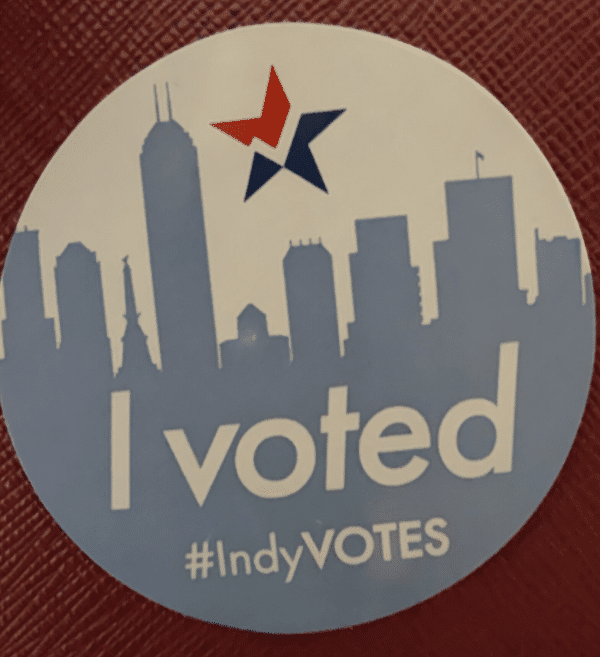
The Indiana Citizen
August 17, 2023
Indiana’s age restrictions on absentee voting, which allow only Hoosiers 65 and older to cast a ballot by mail, has been upheld by a split 7th Circuit Court of Appeals with the majority saying the restriction represents “sound legislative judgment.”
However, the dissenting judge argued his colleagues should have given the parties more time to litigate the case before reaching a final decision.
The decision in Tully et al. v. Okeson, et al., 22-2835, might be the last round in a fight that began in 2020 during the COVID-19 pandemic. This ruling, issued Tuesday, marks the second time the case has appeared before the 7th Circuit. The plaintiffs first presented their arguments to the appellate court in 2020 and then unsuccessfully tried to convince the U.S. Supreme Court to hear the case in 2021.
Barbara Tully, an Indianapolis resident, and 12 other Indiana voters filed the lawsuit in the U.S. District Court for the Southern District of Indiana, claiming the state’s prohibitions on absentee voting based on age violated the constitutional guarantees of the right to vote.
Indiana had lifted the restrictions on absentee voting for the spring 2020 primary election so Hoosiers could vote from home rather than having to vote in person and risk exposure to the coronavirus. However, the limitations were put back in place for the November general election.
The Hoosier state’s absentee ballot statute, Indiana Code section 3-11-10-24, contains more carve outs for voting by mail than just age. Absentee voting is available to registered voters in other limited circumstances including being confined to a hospital, being out of the county on Election Day, or having to work the entire 12 hours the polls are open.
Tully and her co-plaintiffs focused their challenge on the age provision.
They asserted the age restrictions violated the Equal Protection Clause in the 14th Amendment as well as the 26th Amendment, which was authored by the late Sen. Birch Bayh of Indiana and lowered the voting age from 21 to 18. The district court declined to grant the plaintiffs’ request for a preliminary injunction to block the law in 2020 and the 7th Circuit affirmed because the judges did not want to upend the general election when early voting was already underway.
After the district court granted summary judgment in favor of the state defendants, the plaintiffs returned to the 7th Circuit for oral arguments in May. They focused solely on the 26th Amendment and while the appellate court stated it was not bound by its previous decision, the panel still found that Indiana’s law permitting only elderly Hoosiers to vote by mail does not abridge the right to vote for those under 65.
“Absentee voting is available for individuals who, because of vocation, occupation, or physical condition, cannot get to the polls on election day,” Senior Judge Kenneth Ripple wrote for the majority. “Indiana has included ‘elderly’ voters among this group – and with good reason. It represents a sound legislative judgment that these individuals encounter special barriers in exercising their right to vote.”
The 7th Circuit found guidance in a case involving the 24th Amendment which, like the 26th Amendment, includes language prohibiting the abridgement of the right to vote. In the 1965 Harman v. Forssenius decision, the U.S. Supreme Court found unconstitutional a Virginia law that required voters to either pay a poll tax or file an annual certificate of residence in order to vote.
Although the plaintiffs also cited Harman, arguing any imposition on voting violates the Constitution, the 7th Circuit adopted a narrower interpretation of the ruling. The majority found Harman holds that abridgement must involve the imposition of a “material requirement.”
“Indiana imposes no requirements, much less material requirements, on the exercise of the franchise through this accommodation of the elderly,” Ripple wrote. “The extension of absentee voting to the elderly does not impose any unconstitutional burden on the right of those under sixty-five to exercise the franchise.”
Judge John Lee concurred with the majority that only those requirements that materially restrict an individual’s ability to vote would violate the Constitution.
However, he hesitated to conclude, as his colleagues did, that Indiana’s absentee statute does not impose a “materially onerous requirement” on Hoosiers under age 65. He believed the case should have been remanded to the district court so the parties could further develop the factual record.
“The practical difficulties of casting a ballot in person in Indiana, including the challenges of casting a ballot in person in Indiana, including the challenges of locating and physically going to a polling place during regular hours and any costs related to doing so (such as lost wages or child care costs), to the extent they are imposed on appellants because of their age, may rise to such a level as to render that method of voting unconstitutionally ‘cumbersome,’ when compared to the absentee-voting procedure to which the elderly are entitled,” Lee wrote.
